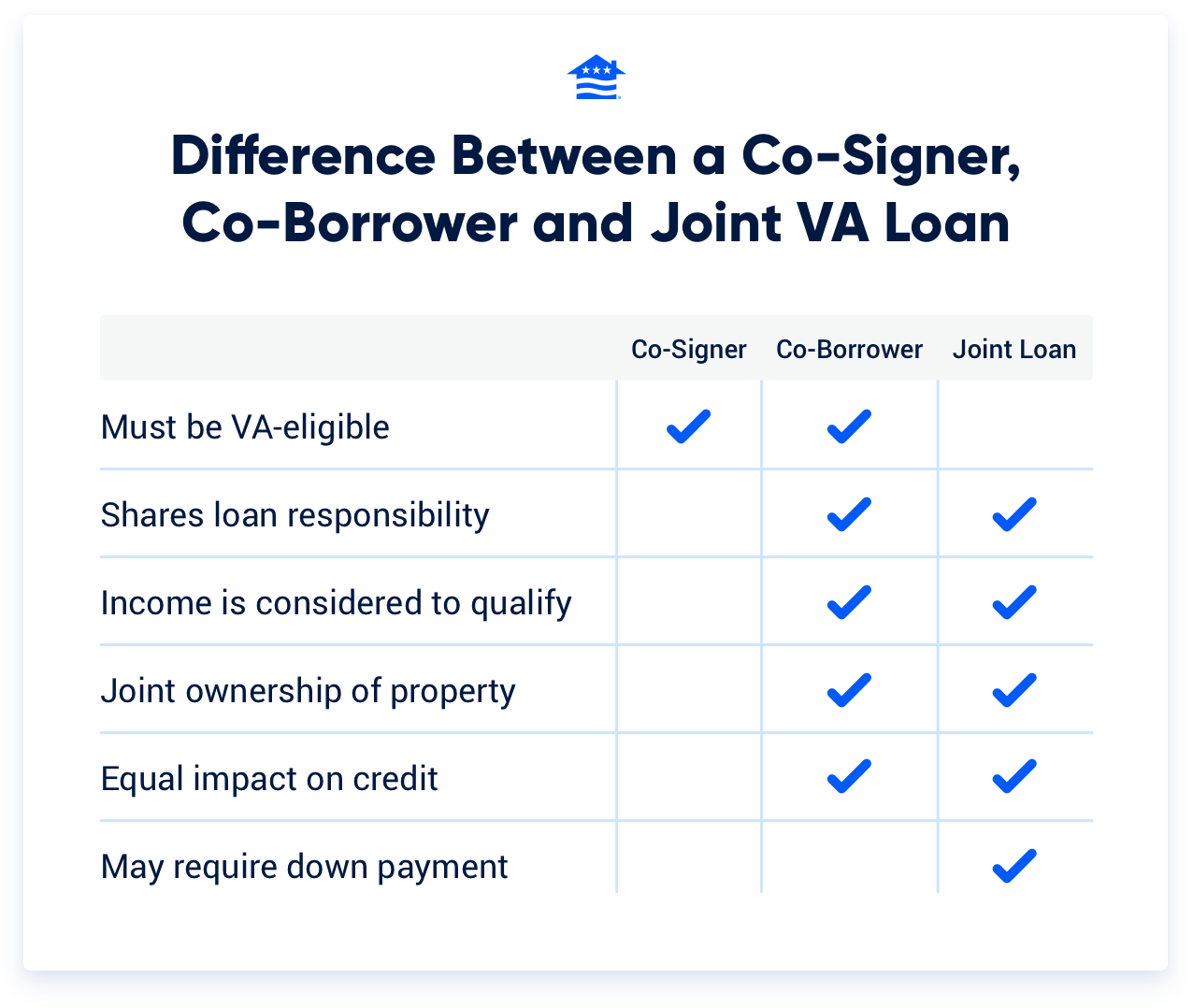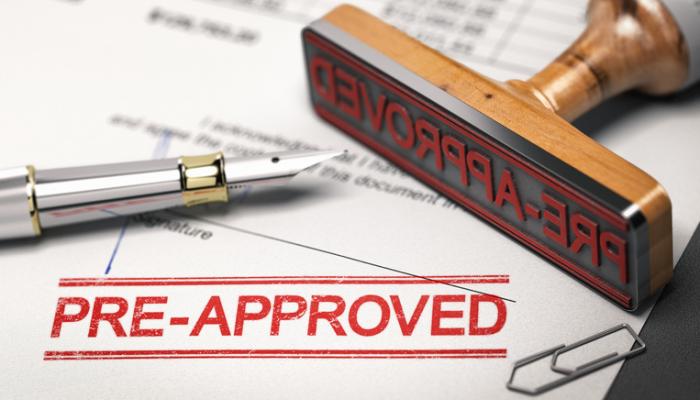Understand the eligibility criteria, process and advantages of joint VA loans and how they can be a valuable resource for Veterans or service members.
For many military members, the dream of homeownership often comes with personal relationships and financial strategies outside the military community. It's not uncommon for a service member to consider buying a home with a non-military individual, whether it’s a family member, friend or life partner.
A joint VA loan allows you to enjoy the benefits of a VA loan as long as one of the borrowers meets the eligibility requirements.
What is a joint VA loan?
A joint VA loan refers to a mortgage loan backed by the U.S. Department of Veterans Affairs (VA) where at least one of the borrowers is eligible for a VA loan. Two or more individuals may apply for a VA joint loan together, and all those on the loan will be held responsible for payments and share ownership of the home.
These loans don’t require any mortgage insurance or a down payment for the Veteran’s portion, which can be a huge advantage for borrowers. The VA guaranty covers a portion of the outstanding balance if the borrower defaults, which allows more favorable terms and competitive interest rates.
Traditional VA Loan vs Joint VA Loan
The main difference between a traditional VA loan and a joint VA loan is the involvement and entitlement usage of the borrowers. With a traditional VA loan, the borrower is either a Veteran alone or with their spouse, and the entire loan is covered by the Veteran's entitlement and the VA guarantee.
Applying with a co-borrower on a traditional VA loan can be similar to a joint loan, but the co-borrower must be VA-eligible. VA joint loans allow for non-military borrowers to be on the loan.

Who can get a joint VA loan?
The VA has certain restrictions on who can be on the loan for it to be considered a joint VA loan. It’s important to understand that VA loans function differently based on the marital status of the borrowers.
A VA loan involving a Veteran and a spouse is usually not treated as a joint loan if the spouse is not a Veteran or a Veteran not using entitlement on the loan. VA loans treat a Veteran and their spouse as one entity, even if only one applicant meets the service requirements. When a Veteran and a non-Veteran borrow together, it is considered a joint VA loan.
Common borrower combinations for a joint VA loan include:
- Veteran and at least one non-Veteran who is not their spouse
- Veteran and one or more Veteran not using their entitlement and not a spouse
- Veteran with their Veteran spouse, both using their entitlement.
- Veteran and one or more Veteran, all using their entitlement and not a spouse
Joint VA Loan Requirements
In addition to traditional VA loan requirements, there are joint VA loans guidelines to be aware of:
- Veteran using entitlement must occupy the property as their primary residence
- Down payment may be required for non-military borrowers
- Veteran and any non-spouse borrower must require prior approval
- Veterans must provide a written agreement if they're using unequal entitlement amounts
- Creditworthiness and income of all borrowers on the loan are assessed
- The VA funding fee must still be paid by Veteran using entitlement unless exempt
VA Entitlement and Joint Loans
VA loan entitlement is the amount the Department of Veterans Affairs (VA) guarantees on a VA home loan. The VA will only guarantee the Veteran's portion of the loan, so a down payment might be necessary if there's a non-military borrower who isn't your spouse on the loan.
If two or more VA-eligible borrowers apply together, not every borrower is required to use their entitlement. If only one borrower uses their entitlement, the VA will only guarantee 25% of the portion of the loan covered by the Veteran using entitlement.
If both VA-eligible borrowers want to use their entitlement, that is completely acceptable. However, a written agreement is required if there is unequal entitlement usage between Veterans.
Pros and Cons of Joint VA Loans
| Pros | Cons |
|---|---|
| May qualify easier with multiple borrowers | Must pay VA funding fee |
| Only one borrower must be VA-eligible | May require down payment for non-military borrowers |
| Multiple incomes can increase buying power and home budget | May tie up entitlement, making it harder to reuse VA benefits |
When to Use a Joint VA Loan
There are certain instances when a joint VA loan may be your best choice. Let’s take a look at some common scenarios:
- Purchasing with a non-Veteran friend or family member: A Veteran looking to purchase a home with a friend who isn’t a spouse or family member might opt for a joint loan.
- Unmarried couples: A joint VA loan can offer the perfect solution for a Veteran and their unmarried partner to co-purchase a home while leveraging the Veteran's benefits. If a Veteran plans to buy a home with a fiancé who is a non-Veteran and they want to close the loan before getting married, a joint loan would be necessary.
- Combined resources: A Veteran might want to pool resources with a non-Veteran to afford a more expensive property that would be beyond their individual financial reach.
- Purchasing a multifamily home with more than four units: A Veteran co-owning a property with other eligible Veterans can have four residential units, one business unit and an additional unit for each participating Veteran.
- Second VA loan: If a Veteran has already used their entitlement on a home but has some remaining, they might use a joint loan with another Veteran who has full entitlement.
In each of these cases, it's crucial to understand that the VA will only guarantee the portion of the loan corresponding to the eligible Veteran's entitlement, and non-Veterans on the loan will typically need to make a down payment on their share of the purchase.
Related Posts
-
 Can Your Mortgage Be Denied After Preapproval?It is possible for you to get denied for a home loan after being preapproved. Find out why this may happen and what you can do to prevent it.
Can Your Mortgage Be Denied After Preapproval?It is possible for you to get denied for a home loan after being preapproved. Find out why this may happen and what you can do to prevent it. -
 VA Renovation Loans for Home ImprovementVA rehab and renovation loans are the VA's answer to an aging housing market in the United States. Here we dive into this unique loan type and the potential downsides accompanying them.
VA Renovation Loans for Home ImprovementVA rehab and renovation loans are the VA's answer to an aging housing market in the United States. Here we dive into this unique loan type and the potential downsides accompanying them.
